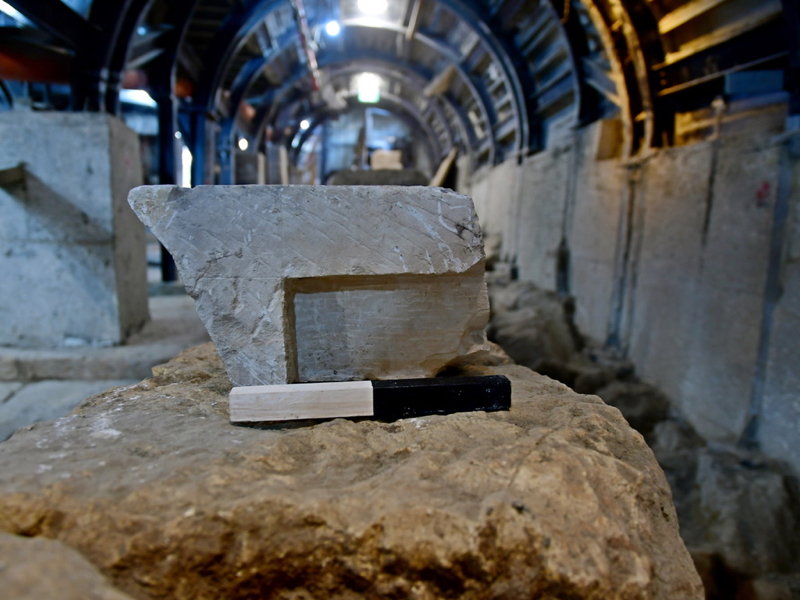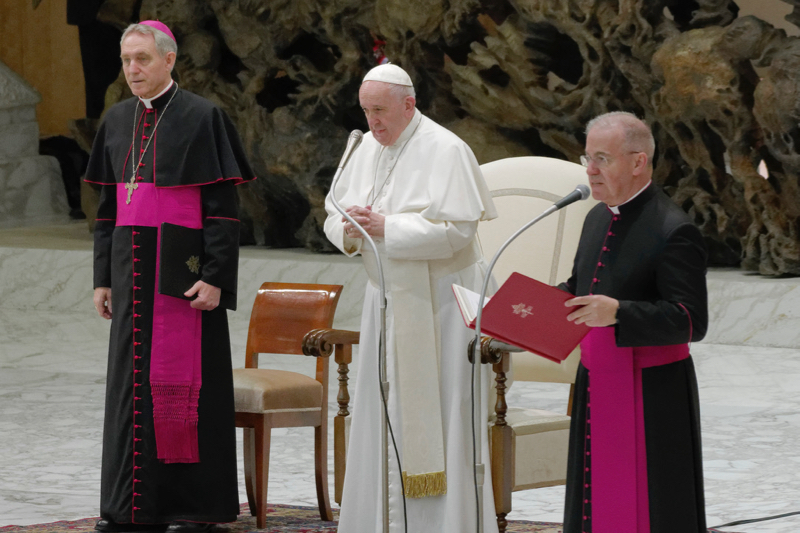Pope Francis is urging the United States and Iran to avoid an escalation of their conflict by respecting international law and showing self-restraint.
During his annual “state of the world” address to ambassadors accredited to the Holy See from across the world, the 83-year-old Roman Pontiff said the tensions between Washington and Tehran threaten the future of Iraq and are sowing the seed for a larger battle. Last year, the Pope said he wanted to visit Iraq in 2020, a trip that would allow him to show solidarity with the persecuted Christians in the country.
“Particularly troubling are the signals coming from the entire region following the heightening of tensions between Iran and the United States, as well as setting the groundwork for a vaster conflict that all of us would want to avert,” the Pope told the diplomats gathered in the Sala Regia room of the Vatican’s Apostolic Palace, whose magnificent frescoes depict dramatic moments in the life of the Church including the Battle of Lepanto and the return of Gregory XI from Avignon to Rome.
He added: “Dialogue – not arms – is the essential way to resolve disputes.”
In a wide-ranging, eight-page speech, the Pope focussed on the various threats to the world while reviewing the foreign visits he had made during 2019.
The Holy See continues to wield soft-power political influence across the world stage. It has formal diplomatic relations with 183 states, along with the European Union and the Order of Malta, and 89 countries have permanent embassies to the Vatican in Rome.
During his address, Francis praised the initiatives to protect the environment by the Swedish teenager Greta Thunberg but said efforts by international politics to respond to climate change have been “very weak and a source of grave concern”. He said the Mediterranean Sea continues to be a “vast cemetery” due to those dying in their attempts to arrive in Europe adding that “many thousands of persons in our world present legitimate requests for asylum, and have verifiable humanitarian needs and a need for protection that are not adequately identified.”
He also warned about “inequality, injustice and endemic corruption” across the American region stressing that only by re-inforcing democratic institutions and promoting the rule of law can “anti-democratic, populist and extremist tendencies” be countered.
Francis’ pontificate has seen the rise of nationalist, populist and anti-migrant sentiment across the world, placing the Pope in conflict with the policies of leaders such as US President Donald Trump, Brazil’s Jair Bolsonaro and, on his own doorstep in Italy, the rise of the right-wing Northern League party.
The Jesuit Pope has developed a statesmanlike voice on the global stage seeking to uphold the importance of cross-country collaboration at a time when many western political leaders are focussing on national concerns. And today he urged Italy, which has been on the front line of the migrants' crisis, to “rediscover that spirit of openness to the future”.
Throughout his talk, the Pope repeatedly emphasised that the world’s gravest difficulties can only be solved through joint action. He offered his support to the institutions formed after World War II set up to maintain peace, including the United Nations.
He cited Robert Schuman, the Christian Democrat politician and one of the founders of the European Union, adding that the “European project continues to be a fundamental guarantee of development for those who have long shared in it, and an opportunity for peace in the aftermath of turbulent conflicts.”
But Francis warned that the post-war “multi-lateral system” was in crisis because it had lost a sense of common purpose and identity.
“Whenever the lexicon of international organisations loses a clear objective anchoring, one risks fostering estrangement rather than rapprochement between the members of the international community, with the consequent crisis of the multilateral system, which is now sadly evident to all,” said Francis.
“In this context, there is a clear need to move once again towards an overall reform of the multilateral system, beginning with the UN system, which would make it more effective, taking into due account the present geopolitical context.”
Focussing on Europe, he said that “the fire at Notre Dame Cathedral in Paris showed how even what seems so solid can be fragile and easily destroyed” adding that the fire “revived the question of Europe’s historical and cultural values, and its deeper roots”. He added: “In situations where a framework of values is lacking, it becomes easier to identify elements of division than those of cohesion.”
During his speech, Francis also reflected on his visit to the United Area Emirates, the first by a Pope to the Arabian Peninsula. During that trip he signed a document on human fraternity, promoting Muslim-Christian co-operation. Francis stressed that the term “minorities” should be rejected in place of citizenship. Christians are rarely awarded citizen status in Muslim-majority countries.
“To this end, it is particularly important to train future generations in inter-religious dialogue, the main road to greater knowledge, understanding and reciprocal support between the members of different religions,” he said.
Francis also told the ambassadors that over the last year the “Holy See has renewed its commitment to bring to light abuses already committed and to ensure the protection of minors through a wide range of norms for dealing with such cases,” pointing to the new legislation he had issued following last February’s abuse summit.
He said the abuse crisis points to the urgent need to assume “educational responsibilities” and announced that on 14 May 2020 he will host a worldwide event titled “Reinventing the Global Compact on Education.”
The Pope explained: “This gathering is meant to rekindle our commitment to and with young people, renewing our passion for a more open and inclusive education, including patient listening, constructive dialogue and better mutual understanding.”
He concluded his speech by reminding the diplomats that 2020 was the 500th anniversary of the death of the renaissance artist Raphael, whose art had a message for today.
“Just as an artist’s genius can blend raw materials and different colours and sounds to create a unique work of art, so diplomacy is called upon to harmonise the distinctive features of the various peoples and states in order to build a world of justice and peace. This is in fact the beautiful masterpiece that all of us want to be able to admire.”



 Loading ...
Loading ...